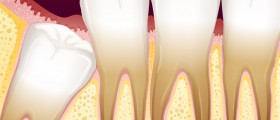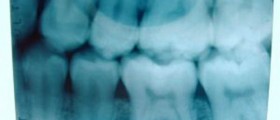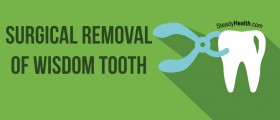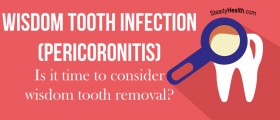
Tooth extraction is never a pleasant experience. During the procedure, patients may feel uncomfortable pressure as well as anxiety, but there will typically be no pain, because dentists use a local anesthetic to numb the area. However, as soon as the anesthetic wears off, the pain will probably set in.
Tooth extractions are sometimes required, for example when a tooth is severely affected by decay and is beyond repair, or if there is not enough room in the jaw for all the teeth to grow normally.
Wisdom teeth are often extracted even if they are not affected by cavities. They often become impacted, which means that the wisdom tooth has either not erupted correctly, or it may grow at an abnormal angle, possibly pushing against the adjacent teeth and damaging them. In those cases, dentists will strongly suggest the extraction of wisdom teeth.
The extraction of wisdom teeth is a common and routine medical procedure. It may be no more difficult or painful than a filling, and many wisdom teeth are extracted right in the dentist's office. It is sometimes also done in a surgical procedure, where the dentist or the surgeon makes an incision and removes the tooth, namely when the roots are curved, or some other complication makes an incision necessary. This is done with a local anesthetic, but the zone where the tooth used to be usually hurts for several days after the procedure. Sometimes the pain can extend to the entire jaw or to some parts of it.
Causes of jaw pain after wisdom tooth extraction
Sometimes an impacted wisdom tooth, which is hard to keep clean through normal brushing, becomes infected. Because the impacted teeth are not properly erupted, the infection can easily spread to the jaw bone. Even after the tooth is removed, the infection takes some time to heal, which may lead to prolonged pain in the jaw. Patients will be given antibiotics at the time of removal if signs of infection were present.
In addition, because the impacted teeth are usually only partially erupted, the extraction requires drilling into the jaw bone to remove the tooth in its entirety. This trauma for the bone causes pain in the jaw after the extraction.
These are the main reasons for jaw pain after the extraction of wisdom teeth. However, even without these complications, the extraction of teeth causes a certain degree of trauma to the jaw, through pulling, drilling and other operations required for the removal of the tooth, which makes the area a bit sore or even painful afterwards.
Solutions for jaw pain after wisdom tooth extraction
The single best solution for the pain in the jaw bone following a wisdom tooth extraction is to take painkillers. The pain is bound to set in as soon as the anesthetic starts wearing off, which is why dentists recommend taking over the counter painkillers, for example ibuprofen, even before the pain actually starts. The painkillers or analgesics should be taken every few hours for 24 hours after the extraction. After that, they should only be taken when the pain starts.
The pain can worsen if the instructions for the aftercare provided by the dentist are not strictly followed. If everything goes normally and without complications, the pain should start decreasing within a couple of days. Patients who notice that the pain gradually grows worse rather than better, or who notice signs of infection like fever, warmth around the area, and pus, should get in touch with their dentist immediately.

















Your thoughts on this
Loading...